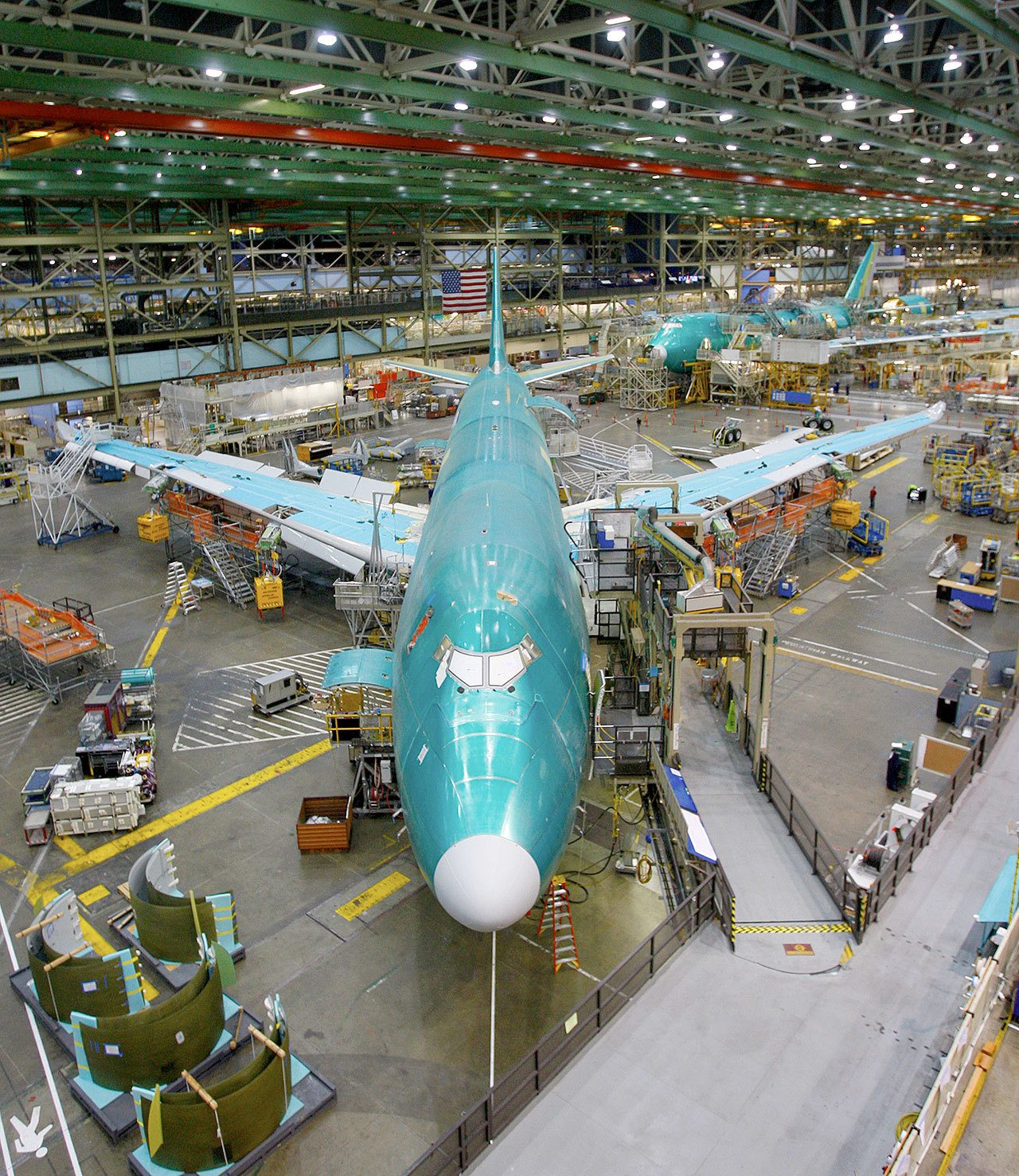EVERETT — The Queen of the Skies could soon be grounded forever.
Fifty years after the 747 brought Boeing and the aerospace industry to Everett, the company says it is considering ending production of the iconic airplane. It revolutionized air travel and grabbed people’s imaginations when it entered service in 1970. Since then, Boeing has made more than 1,500 747s. However, new technology, changing travel patterns and economics have overtaken the world’s first jumbo jet.
Boeing said in a regulatory filing Wednesday that ending 747 production in the next few years is a real possibility. The second quarter earnings filing also reported a $234 million loss. It was Boeing’s first quarterly loss in nearly seven years. Flagging demand for the massive 747 contributed to the loss.
Boeing absorbed $3 billion in charges before taxes from the 747, 787 and KC-46 programs, resulting in a loss of 44 cents per share. Aside from the charges, the company showed steady performance during the quarter, and investors pushed up Boeing’s share price by $1.08 by the end of trading on Wall Street.
The company already plans on reducing 747-8 production by September, when it will go from making one jumbo jet a month to one every two months. Demand for the massive airplane has dramatically dropped off in recent years. Boeing has not had any orders for the passenger version since 2013, and only a handful of freighters orders since then.
For several years, company leaders have insisted that a rebound in air cargo would spur new orders for the 747-8 freighter. Now, they say they hope to get enough orders to keep the line open at the lower production rate.
Boeing has “a number of very viable campaigns underway to fill” delivery slots at the lower production rate of one 747 every two months, Boeing President and Chief Executive Dennis Muilenburg said Wednesday in a conference call with financial analysts and reporters.
Those campaigns are for replacement orders of older 747-400 freighters approaching retirement age, he said.
“Despite air cargo’s weakness, we continue to see the 747 as a unique and significant value creator for our customers in the long-term,” he said.
The company continues to pursue 747 sales and is “aggressively” working to drive down production cost and increase efficiency, Muilenburg said.
In the 10-Q earnings report filed with the U.S. Securities and Exchange Commission, Boeing said if it cannot get enough new orders, “we could record additional losses that may be material, and it is reasonably possible that we could decide to end production of the 747.”
Many industry experts are skeptical that enough replacement orders will materialize to support the 747 line, which employs several thousand workers. In 2012, when Boeing delivered 31 747s — nearly three a month — it directly supported 6,100 workers and another 3,200 indirectly, according to a state-commissioned report on the aerospace industry.
Today, the 747 line employs far fewer given the lower production rate. Also, earlier this year, the company combined many management and administrative functions for the 747 and 767 lines, both of which are in Everett, to slim overhead costs. Boeing will not say exactly how many people work on any particular line.
Industry experts say the aerospace giant could close the line after assembling two 747-8s which will be modified to ferry the U.S. president as Air Force One.
Wednesday marked the third consecutive quarter that Boeing has reported charges against earnings.
So far, “2016 has been a messy year for Boeing,” Edward Jones investment analyst Jeff Windau said.
Still, the company’s cash flow and sales are good, and its backlog remains huge with orders for nearly 5,700 commercial airplanes valued at $417 billion.
Wall Street had expected the Boeing to post an even larger loss. The adjusted per-share loss of 44 cents was about half of what financial analysts had expected, according to surveys by Zacks Investment Research and Thomson Reuters.
Boeing lowered its projected full-year earnings to the range of $6.10 and $6.30 per share, from $8.15 and $8.35. Revenue is still expected to be $93 billion to $95 billion.
The loss was driven by write offs worth $3 billion before taxes. The charges, which were $2.1 billion after taxes, stem from the 747, 787 and KC-46 tanker programs.
Only the 747 charge — $1.2 billion before taxes — is related to future sales.
Boeing’s decision to write off rather than refurbish two early-build 787 Dreamliners heavily used during flight and ground tests resulted in a $1.2 billion charge before taxes. The cost of further rework for the KC-46 aerial refueling tanker being developed for the U.S. Air Force resulted in a charge of $354 million before taxes.
The spate of write offs could signal a management shift from Muilenburg, who took over as CEO last year, or more cautious accounting due to a federal investigation into Boeing’s bookkeeping for the 747 and 787 programs, Windau said.
Boeing revenue was up about 1 percent to $24.8 billion mostly due to faster production of commercial jets. It delivered 199 commercial jets during the quarter, up from 197 during the same period last year and 181 two years ago. Boeing takes a deposit when a jet order is made but doesn’t collect the bulk of the cash until a jet is delivered.
The company spent $2 billion buying back shares from investors during the quarter. So far this year, it has bought back shares worth $5 billion. It plans to spend another $5.8 billion repurchasing shares over the next two years, Boeing Chief Financial Officer Greg Smith said.
Material from the Associated Press was used in this report. Dan Catchpole: 425-339-3454; dcatchpole@heraldnet.com; Twitter: @dcatchpole.
Talk to us
> Give us your news tips.
> Send us a letter to the editor.
> More Herald contact information.

























